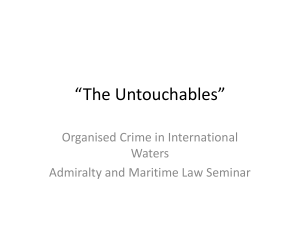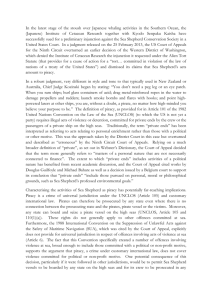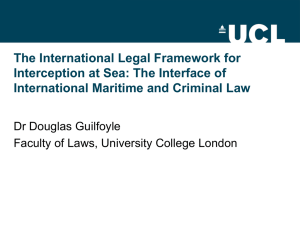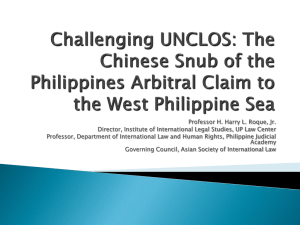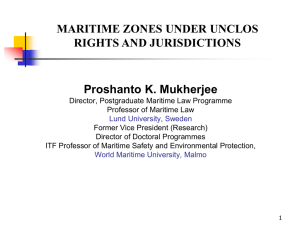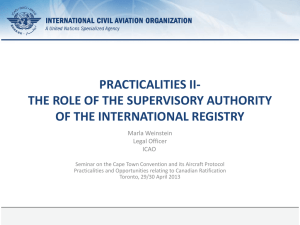Maritime Security the Context
advertisement
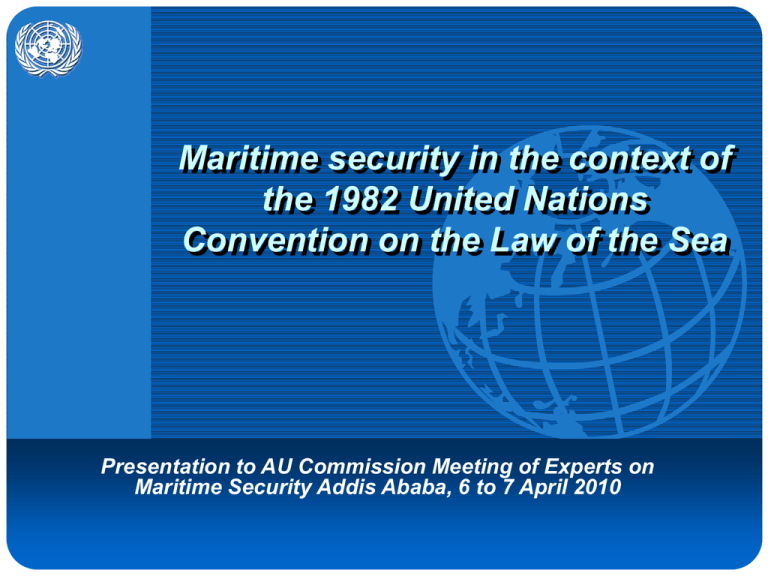
Maritime security in the context of the 1982 United Nations Convention on the Law of the Sea Presentation to AU Commission Meeting of Experts on Maritime Security Addis Ababa, 6 to 7 April 2010 Background: The United Nations Convention on the Law of the Sea • The United Nations Convention on the Law of the Sea (the Convention) sets out the legal framework within which all activities in the oceans and seas must be carried out • 44 AU Member States are parties to UNCLOS • UNCLOS, as complemented by other legal instruments, provides the legal basis for enforcement action in the territorial sea, straits used for international navigation, archipelagic waters, contiguous zone, exclusive economic zone and the high seas Implementing Agreements (i) Agreement relating to the implementation of Part XI of the United Nations Convention on the Law of the Sea of 10 December 1982; (ii) The United Nations Agreement for the Implementation of the Provisions of the United Nations Convention on the Law of the Sea of 10 December 1982 relating to the Conservation and Management of Straddling Fish Stocks and Highly Migratory Fish Stocks. Major threats to maritime security • Piracy, illicit traffic in drugs, smuggling of migrants, illegal, unreported and unregulated fishing and dumping of toxic waste • UNCLOS provides preventive and enforcement measures regarding unlawful acts at sea. • There are different enforcement rights in the different maritime zones Flag State jurisdiction • Under article 94 of UNCLOS, the principle of Flag State jurisdiction applies to all threats i.e. duty of Flag State to effectively exercise its jurisdiction and control over ships flying its flag • The right of visit - a State other than the flag State has the right to board a foreign ship in specific circumstances, including in cases of piracy and where a ship is without nationality (Article 110) • UNCLOS also recognizes the possibility of other treaties providing for a right of boarding Piracy • Articles 100-107 and 110 • Only on the High Seas, EEZ or in areas beyond the jurisdiction of any State • Duty to cooperate in repression of piracy • States may exercise universal jurisdiction • Piratical acts within the territorial sea are considered armed robbery at sea and, are subject to the jurisdiction of the Coastal State • General Assembly and the Security Council have addressed piracy in a number of resolutions Illicit traffic in narcotic drugs and psychotropic substances • Article 108 of UNCLOS: • Duty to cooperate on the high seas and EEZ • Flag State jurisdiction • Right of hot pursuit (article 111, UNCLOS) • 1988 UN Convention against Illicit Traffic in Narcotic Drugs and Psychotropic SubstancesArticle 17 on boarding rights of non- Flag States Smuggling and trafficking of migrants by sea Territorial sea and contiguous zone • Coastal State enforcement rights under UNCLOS Exclusive Economic Zone (EEZ) and High Seas • Hot pursuit under article 111 of UNCLOS • Right of visit under article 110 of UNCLOS • 1988 Protocol against the Smuggling of Migrants by Land, Sea and Air • Smuggling Protocol provides for boarding, search and other rights • • • • • • Illegal, unregulated and unreported (IUU) fishing Articles 61,62, 73 of UNCLOS- enforcement rights of coastal State in Territorial Sea and EEZ Complemented by 1995 United Nations Fish Stocks Agreement (Articles 21, 22 and 23) Boarding and Inspection; Port State Measures 2003 FAO Compliance Agreement 2001 International Plan of Action against Illegal, Unregulated and Unreported Fishing 2009 Agreement on Port State Measures to Prevent, Deter and Eliminate Illegal, Unreported and Unregulated Fishing Dumping of toxic wastes • Article 210 of UNCLOS- States shall adopt national laws, regulations and measures that shall be no less effective than the global rules and standards to prevent, reduce and control pollution • 1972 Convention on the Prevention of Marine Pollution by Dumping of Wastes and Other Matter, (London Convention) and its 2006 Protocol set applicable global rules and standards • Article 216- Coastal State jurisdiction over dumping in Territorial Sea, EEZ or Continental Shelf Conclusion • The Convention stresses the importance of international cooperation in dealing with threats to maritime security • Exemplified through recent regional initiatives such as the MoU on a Sub-regional Integrated Coast Guard Network for West and central Africa under the auspices of the Maritime Organization of West and Central Africa (MOWCA) and the Djibouti Code of Conduct under the auspices of the IMO Trust Fund as referred to in Resolution 55/7 (Informal Consultative Process) UN-FAO Assistance Fund (Fish Stocks Agreement) UN-Nippon Foundation of Japan Fellowship Programme DOALOS Capacity-Building Activities and Related Trust Funds Training activities Train-Sea-Coast Programme Hamilton Shirley Amerasinghe Memorial Fellowship Programme Thank you for your kind attention! http://www.un.org/Depts/los/index.htm Ms. Vita Onwuasoanya Associate Law of the Sea/Ocean Affairs Officer Division for Ocean Affairs and the law of the Sea United Nations Office of Legal Affairs
